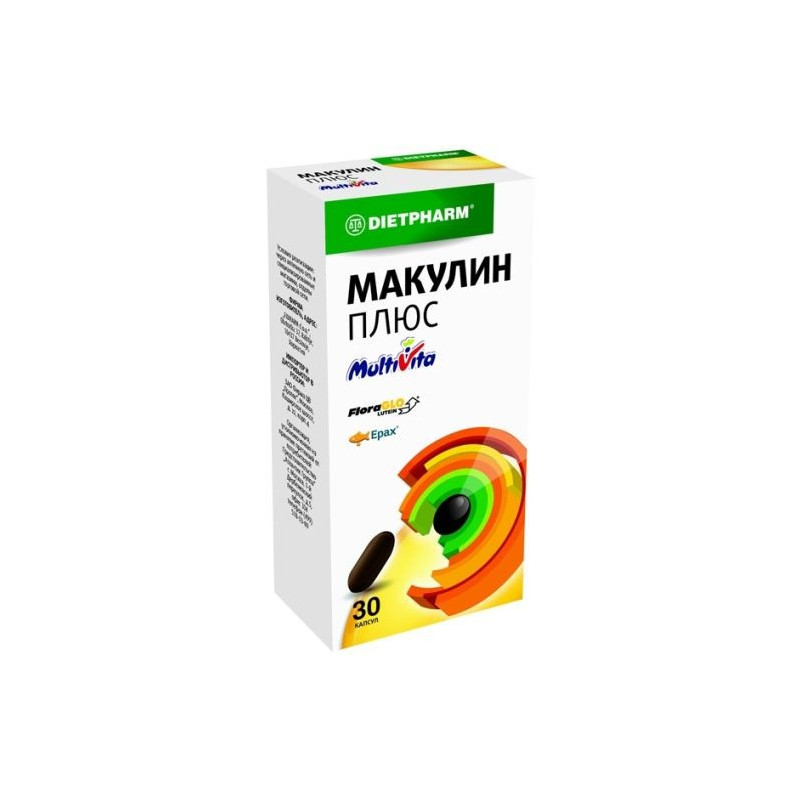



 All payments are encrypted via SSL
All payments are encrypted via SSL
 Full Refund if you haven't received your order
Full Refund if you haven't received your order
Release form
Capsules
Makulin Plus is a source of lutein and zeaxanthin of natural origin.
Technology and nature combined in one capsule of Makulin Plus to keep your eyes in a healthy state for many years!
Lutein and zeaxanthin are carotenoids that filter out the harmful effects of light from the high-energy spectrum (blue light) and act as antioxidants, helping to protect cells from damage and maintain eye health. Of the 600 carotenoids in nature, only two are present in large quantities in the retina (macula) of the eye: lutein and zeaxanthin. The amount of lutein and zeaxanthin in the macular area of the retina is called the optical density of the macular pigment (OPMP) and can be measured.
Many facts confirm the role of lutein and zeaxanthin in reducing the risk of WDM. In fact, the National Eye Institute (National Eye Institute, USA, Bethesda, Maryland) is currently conducting the second major phase of clinical trials related to the study of age-related eye diseases (AREDS2). One of the objectives of the study is to confirm that supplements containing 10 mg per day of lutein and 2 mg of zeaxanthin per day reduce the risk of developing WDM. In addition to reducing the risk of developing eye diseases, individual studies have shown that lutein and zeaxanthin improve vision in WYD patients, cataracts, and people with good health.
The trace elements that make up Makulin Plus are not produced by our body independently and should be included in the daily diet in order to preserve the health of our eyes and reduce the risk of age-related degenerative retinal changes.
Made from marigolds, Lutein Flora Glo® is the world's leading patented brand of lutein used to improve eye health.
Flora Glo® Lutein is the most clinically researched in the world and has proven to be effective in treating retinal diseases (AREDS ½).
Vitamin C has an unusual property to strengthen the walls of capillaries, which helps to improve the condition of the fundus vessels, which in turn prevents dangerous hemorrhages into the vitreous body and the retina of the eye. If its level in the eye tissue decreases, this leads to a consolidation of the vessel lining, arterial obstruction occurs. This leads to macular degeneration or to the so-called retinopathy. The daily intake of vitamin C should be 60 mg.
The functions of vitamin C include maintaining the physical activity of the eye muscles, improving perception and transmitting the visual signal, maintaining the optic nerve in its normal state, maintaining a fairly high level of collagen in the lens and vitreous body.
In clinical studies, it was found that zinc deficiency impairs glucose uptake by the eye lens cells and contributes to the formation of cataracts.Doctors advise with this disease to make a blood test for zinc. If the analysis shows that this microelement in the body is small, then you should change the diet to include products with high zinc content.
Another eye disease is associated with zinc deficiency - retinal macular dystrophy. As already mentioned, the concentration of zinc in the retina is higher than in many other organs. It participates in the important biochemical reactions of the retina, necessary for the maintenance of vision.
Dystrophy of the retina is a disease in which dystrophic changes occur in the yellow spot. The photoreceptors cones that perceive the light are affected, and the person gradually loses central vision. The name of the disease comes from two words: macula - macula - and degeneration (dystrophy) - malnutrition.
The development of retinal dystrophy is associated with atherosclerotic changes in the vessels of the choriocapillary layer of the eyeball. Circulatory disorders in the choriocapillaries, which, in fact, are the only source of nutrition for the macular area in the background of age-related changes in the retina, can serve as an impetus for the development of the dystrophic process. The mechanism of development of atherosclerotic changes in the vessels of the eye is the same as in the vessels of the heart, brain, and other organs. It is assumed that this violation is associated with genetically determined vascular sclerosis, related to the macula.
The level of macular pigmentation is of great importance in the development of retinal dystrophy. Macular pigment is the only antioxidant of the retina that neutralizes the effects of free radicals and limits the blue light that acts phototoxicly on the retina.
Risk factors for age-related macular dystrophy:
Contraindicated in pregnancy and lactation.
Active substances: Lutein Flora Glo® 10 mg, Zeaxanthin 2 mg, Vitamin C 60 mg, Vitamin E 10 mg, PUFA omega 3 172 mg, Zinc 10 mg, Copper 0.37 mg.
1 capsule daily with meals. Reception duration not less than 1 month.
Storage conditions
Store in a dry, protected from direct sunlight, out of reach of children at a temperature not higher than + 25 ° C.
